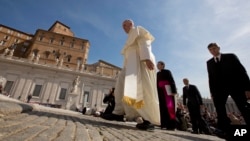The Vatican concluded its first treaty that formally recognizes the State of Palestine, a move that gives legal weight to the Holy See's years-long recognition and that drew fast criticism from supporters of Israel.
The agreement, which the Vatican said aimed to "enhance the life and activities of the Catholic Church and its recognition at the judicial level," comes days before Pope Francis is due to meet Palestinian President Mahmoud Abbas and is likely to solidify relations between the Vatican and Palestinians.
The text of the treaty, covering Church activities in areas controlled by the Palestinian Authority, has been concluded and will be officially signed by the respective authorities "in the near future," said a joint statement released by the Vatican.
Abbas is due to attend a Mass at the Vatican on Sunday to make saints of two 19th and 20th century Palestinian-born nuns.
Vatican officials stressed that the Holy See had given official recognition to the State of Palestine since 2012.
The Vatican's deputy foreign minister, Monsignor Antoine Camilleri, said in an interview with the Holy See's official newspaper that he hoped the agreement would indirectly help the Palestinian State in its relations with Israel.
"It would be positive if the accord could in some way help with the establishment and recognition of an independent, sovereign and democratic State of Palestine which lives in peace and security with Israel and its neighbors," he told l'Osservatore Romano.
But European Jewish Congress President Moshe Kantor called the move "unfortunate" and said it would "diminish the chances of a negotiated peaceful resolution of the conflict and embolden extremists".
Abraham Foxman of the Anti-Defamation League said the treaty was "premature" and said it would undermine a negotiated, two-state solution to the conflict.
The U.N. General Assembly adopted a resolution on Nov. 29, 2012 recognising Palestine as an observer non-member state. This was welcomed at the time by the Vatican, which has the same observer non-member status at the United Nations.
"We have recognised the State of Palestine ever since it was given recognition by the United Nations and it is already listed as the State of Palestine in our official yearbook," Vatican spokesman Father Federico Lombardi said.
During a visit to the Middle East a year ago, Francis delighted his Palestinian hosts by referring to the "state of Palestine" and giving support for their bid for full statehood recognition.





